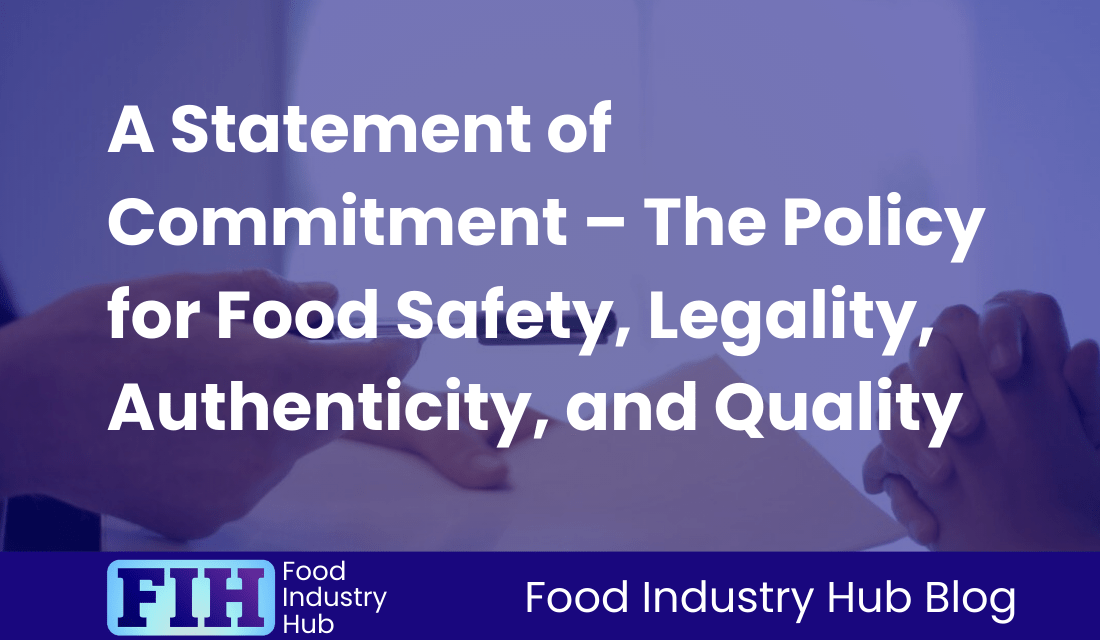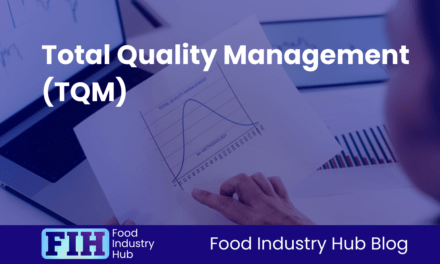Food safety, legality, authenticity, and quality are of paramount importance to any food business. Each of these has a direct impact on business-critical concerns, ranging from brand reputation, consumer safety, and legal compliance.
To demonstrate the commitment of senior management to these areas, there must be a policy that outlines intent and approach. This policy dictates the necessary practices and procedures that must be adhered to in order to ensure food safety and compliance with legal requirements. It also ensures the authenticity of all products manufactured and ensures that only quality produce is made available for sale.
Hierarchically, the Policy for food safety, legality, authenticity, and quality is positioned above applicable procedures and work instructions – so the policy determines the expectations for the food safety and quality management system. Beyond that, though, the policy establishes priorities and acceptable behavioural approaches, so there are real implications for the food safety and quality culture exhibited throughout the business.
In this post, we’ll explore the significance and content of the Policy for food safety, legality, authenticity, and quality.
Purpose and Importance
The purpose of a statement of commitment for food safety, legality, authenticity, and product quality is to ensure that the company is fully committed to delivering high-quality products that meet all safety standards.
The policy should be an authentic expression of senior management intent. There’s no point in having a policy that outlines the company’s commitment to producing safe, legal, authentic food of the required quality if the true attitudes of the most senior managers don’t actually align with that commitment. Every employee should be expected to act in accordance with the policy for food safety, legality, authenticity, and product quality – and be held accountable for upholding the written principals and values stated therein.
It is essential to have such a statement because it demonstrates the company’s commitment to transparency and accountability. By making this information readily available to stakeholders, customers can be assured that they are getting what they paid for while also promoting trust in the brand.
The policy should be broad enough to be applied to any situation, and targeted enough to provide a basis for decision-making at all levels. In other words, a person deciding what to include in a procedure or how to behave in the factory should be able to refer to the policy for food safety, legality, authenticity, and quality for direction. The policy will not include explicit situational instructions, but will state values that should be safeguarded, and objectives that should be met across all circumstances.
A good way of thinking about it is that the policy provides accountability for all other aspects of the management structure and practices:
“Does the procedure satisfy the intent of the policy?”
“Is that behaviour compatible with the expectations of the policy?”
It should be clear and unambiguous whether the policy for food safety, legality, authenticity, and quality has been fulfilled in any setting – even if the content isn’t situationally explicit in the way a procedure or work instruction is.
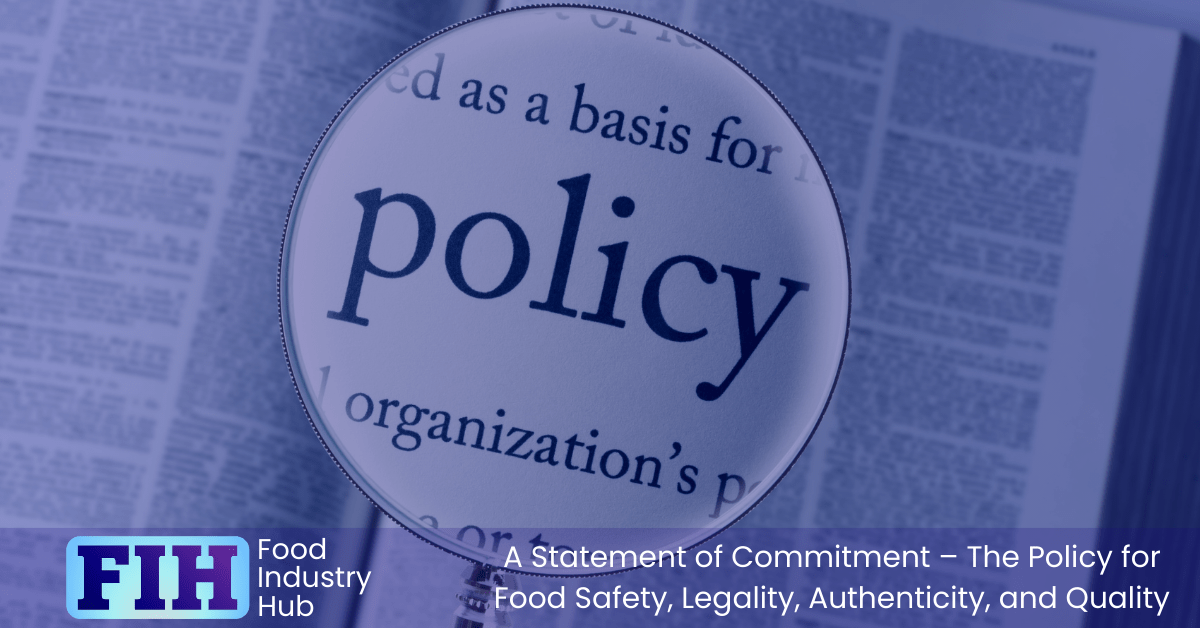
Expressing a Commitment – The role of the policy for food safety, legality, authenticity, and product quality
A policy is foundational for expressing an organisation’s commitment to its customers and stakeholders. The policy should outline the company’s standards and expectations for food safety, including compliance with regulatory and voluntary assurance scheme demands. It should also detail how the company ensures the legality of its products by adhering to all relevant laws and regulations.
Food manufacturers have a very serious responsibility to consumer safety. The policy should make it clear that assurance processes will be enacted to protect consumer safety, and that the company would not knowingly release product onto the market if it had the potential to cause harm.
The authenticity of food products has become increasingly important in recent years as consumers demand greater transparency from manufacturers. A clear statement of commitment to authenticity can help build trust with customers while also ensuring that products remain genuine throughout the supply chain. The policy might be as broad as a commitment to never misrepresent the nature (or processing conditions) of products to customers or consumers – and this is a clear enough commitment to shape all subsequent actions and decisions.
A policy statement on product quality can help set expectations for both internal and external stakeholders regarding the ingredients used in production processes, packaging materials, and overall product quality standards. The policy should make it clear that the company will only release product which meets the required quality (as per its specifications, quality attribute sheets, and customer agreements).
Decision-makers at all levels throughout the food manufacturing business should be in a position to understand the exact expectations held by the senior management team. A detailed policy statement will also ensure that the resulting food quality standards align with the ideals of the company, and that all operations are carried out in accordance with those values.
Food Safety Policy
Food safety is arguably the most fundamental need that any food manufacturer must service. In contrast to almost any other manufactured product, food has the potential to enrich and nourish – or cause injury to the consumer. There is an intimate trust placed on food manufacturing businesses by consumers, and the policy should make it clear that the business intends to uphold that trust.
The policy should very clearly establish the level of importance that the company places on food safety. For the benefit of decision-makers, it may be worth stating that no competing objective should ever be placed ahead of food safety. For example, the policy might explicitly place food safety above production output or direct financial performance.
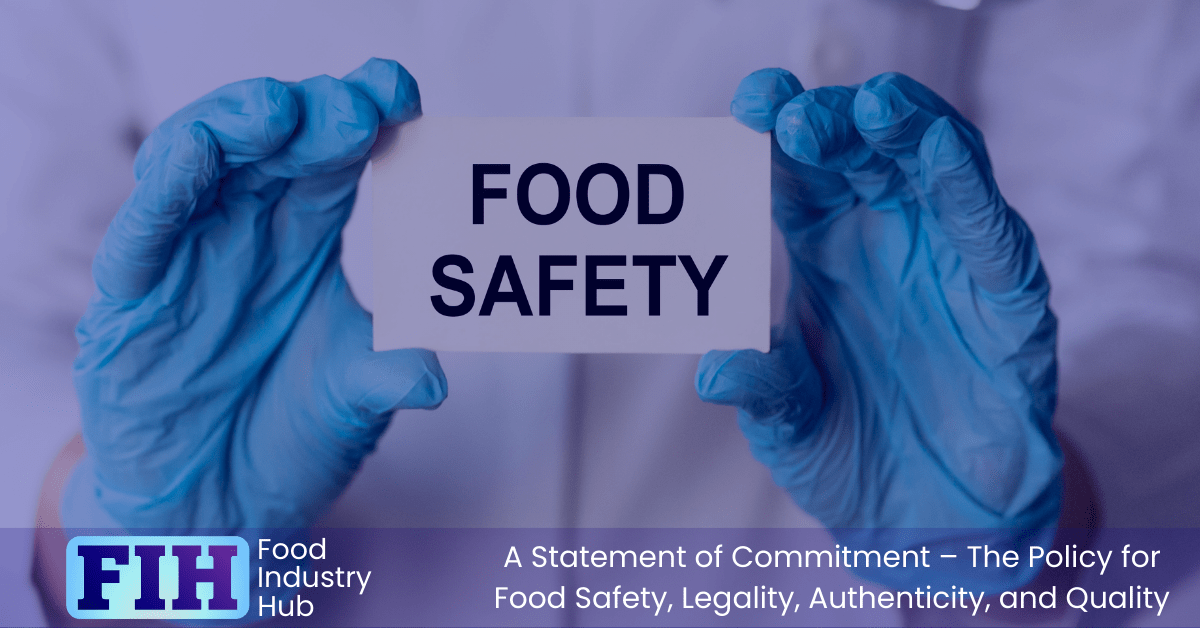
Sign-up for the Food Industry Hub Mail Service
We regularly produce new content for food industry professionals, and the Food Industry Hub Mail Service is the best way to stay up to date with the latest additions.
Signup today to be added to the Food Industry Hub mailing list.
Legality Policy
The policy should commit the business to compliance with any applicable laws and regulations. The policy should broadly outline the ways that the business will identify applicable laws, as well as the mechanisms by which the company will stay abreast of regulatory updates.
Simply, the policy should outline the company’s intention to comply with laws applicable where the business operates, and the market into which its products will be sold. Regulatory compliance can require a significant investment of resource and expertise, and the legality policy should commit the business to appropriate resource allocation as well as stating the company’s intention to comply with the applicable laws.
Authenticity Policy
The authenticity policy should define authentic products as meeting any expectations that customers and consumers can be expected to hold, based on any claims made on- or off-pack (including marketing or promotional messaging) in all respects. This would usually apply to composition, production methods, place of origin, sustainability or ethical claims, and so on – but there are no limitations paced on authenticity and in broad terms, the policy should ensure that customers and consumers are not mislead in any way as to the nature of the products placed on the market.
It’s important to understand that authenticity does not only refer to composition. The most obvious threats to food authenticity might be substitution or adulteration of ingredients by cheaper alternatives, but food can only be considered authentic if all marketing claims and consumer expectations are met. Examples may include ‘free range’ (a claim directly made about a product) or an expectation held about the origin or a product such as Champagne – which would set an expectation of the production location, regardless of whether that claim was included in any of the product’s marketing copy.
The authenticity policy can sufficiently outline the company’s commitment to food authenticity by stating its intention never to mislead customers or consumers – but should be clear enough to eliminate any ambiguity over how that commitment will be fulfilled. Anyone who refers to the authenticity policy should be able to clearly distinguish between authentic and inauthentic food.
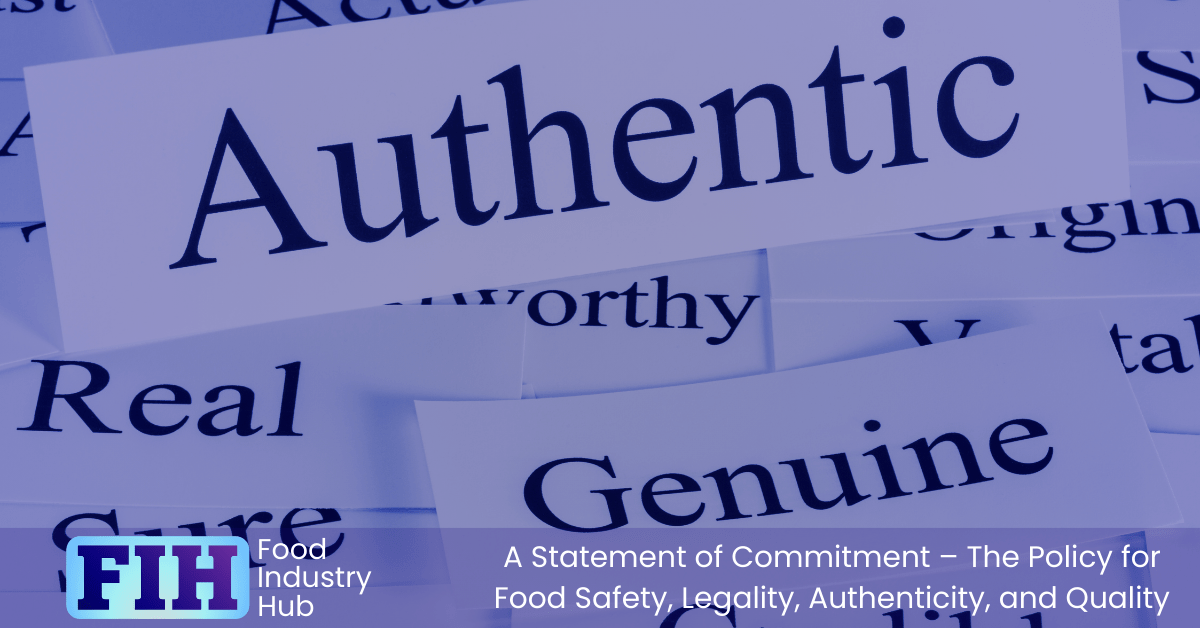
Quality Policy
The quality policy for food manufacturing businesses should begin with a statement of commitment. This statement is the driving force behind the policy and should clearly demonstrate the business’s dedication to producing food products that meet the established quality standards.
The quality policy should be unambiguous in its reference to ‘quality’ – so terms such as ‘high quality’ or ‘best quality’ should be avoided.
Ideally, every product should have defined characteristics and defects listed in a quality attribute sheet (QAS), along with a specification which determines thresholds for acceptable and unacceptable levels at which those characteristics and defects may apply to a consignment of goods. The specification and QAS should be agreed with customers so that quality expectations are aligned between supplier and customer. The quality policy should commit the food business to the implementation of quality assurance systems and quality control processes designed to ensure that all dispatched product conforms to the established quality standards.
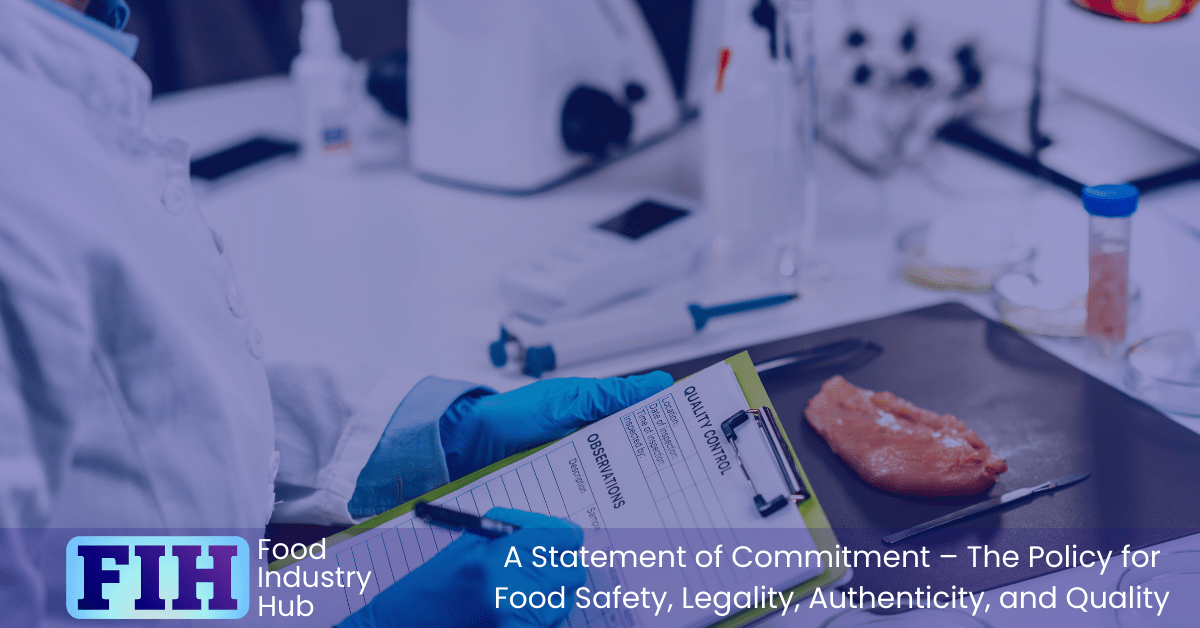
A Commitment to Continuously Improve the Site’s Food Safety and Quality Culture
One of the essential elements of a food safety and quality policy is the commitment to continuously improve the site’s food safety and quality culture. This means that the organisation should not settle for merely meeting base requirements, but it should prioritise creating a food safety culture that permeates every aspect of its operations. The policy should outline how this will be achieved by setting measurable goals, tracking progress, and identifying areas for improvement.
While many of the GFSI-recognised schemes have introduced this as a compliance requirement, continuous improvement of the food safety and quality culture should not be though of as a tick-box exercise. Essentially, the attitudes and behaviours that make up the culture should reflect the priorities established by the policy for food safety, legality, authenticity, and quality – with culture acting as an extension of the documented management system.
Behaviours are a reflection of attitudes, and attitudes are situational expressions of values/ideals. The policy should define the values/ideals that the business expects its employees to uphold – so in effect, the policy could be thought of as being a top-down influencer over the quality of the business. Including a commitment to continually improve the food safety and quality culture makes it clear that there is a direct relationship between the company’s stated values and its cultural expectations, and sets an objective for improvement to which the business is accountable.
The Policy Should Be Communicated to All Stakeholders, and Properly Adhered to
The policy should be communicated to all stakeholders within the organisation from the top-level management to entry-level employees. These stakeholders must understand that they have an essential role in ensuring that this policy is followed.
The Policy for food safety, legality, authenticity, and quality should be a guiding star for all actions and decisions throughout business operations. Any employee should be able to refer to the policy and for assurance that they are acting in accordance with the company’s values and intent.
The policy can be a very practically valuable document, but only if it is properly disseminated throughout the organisation. Having a policy is meaningless if it isn’t distributed effectively and actively used as a point of guidance.

